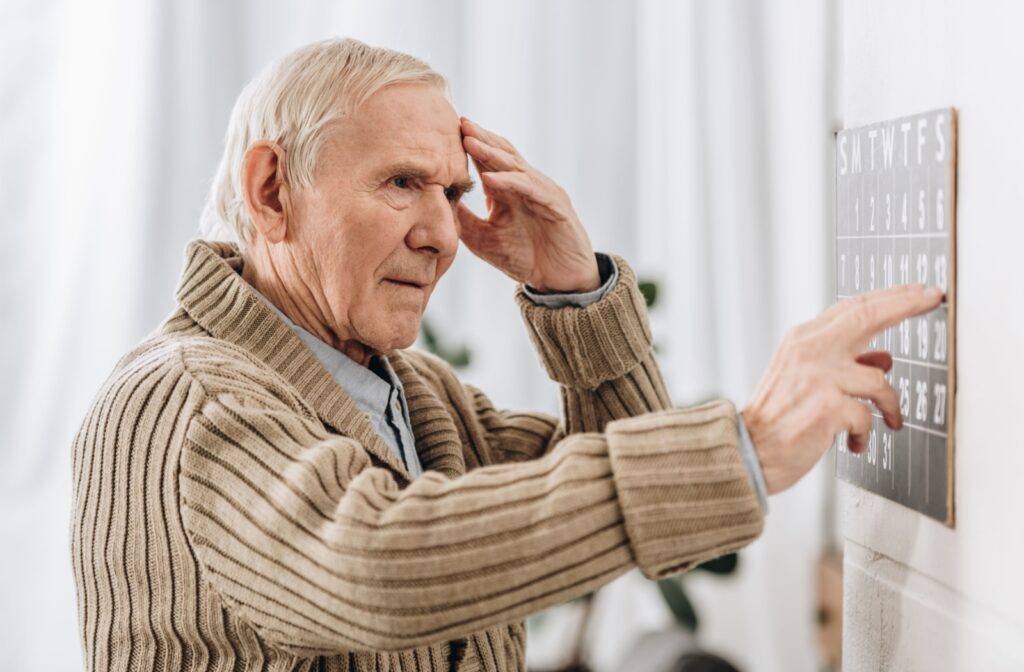Memory loss is a challenging condition that can affect individuals at any stage of life, but it is particularly common in older adults. For family members and caregivers, the responsibility of supporting someone with memory loss can be overwhelming.
However, by employing patience, understanding, and specific strategies, you can greatly improve the quality of life for your loved one. Below, our team will explore actionable steps to help someone manage memory loss while maintaining dignity, connection, and emotional well-being.
1. Understand the Root Cause
Memory loss can stem from various causes, including aging, Alzheimer’s disease, dementia, stress, or even nutritional deficiencies. The first step to providing effective support is understanding what’s behind their memory concerns. Schedule a visit with a healthcare professional to get a proper diagnosis. Once you know the underlying cause, you can better tailor your support to their unique needs.
2. Create a Safe and Supportive Environment
For individuals with memory loss, safety should be a top priority. Memory lapses can result in forgetting to turn off the stove, leaving doors unlocked, or misplacing essential items like medications.
- Simplify the living space by labeling cabinets, creating designated spots for things like keys or wallets, and reducing clutter.
- Use reminders and cues. Install clocks with large displays, place sticky notes with instructions in visible areas, or set up a whiteboard with daily tasks and schedules.
- Make the environment safe. Consider installing safety features such as grab bars in bathrooms or locking cabinets with potentially harmful substances.
By ensuring that their environment is clear, organized, and secure, you’ll reduce stress for both yourself and your loved one.
3. Establish Routines
Consistency can significantly help people with memory loss feel more in control of their surroundings. Create and maintain a daily routine that includes activities such as meals, exercise, and leisure at the same times each day. When they know what to expect, it reduces confusion and improves their ability to engage and recall activities.
If you’re introducing new habits or tasks into their routine, do so gradually and be patient during the adjustment period.

4. Communicate in a Supportive Way
Communication can become complicated when a person is struggling with memory issues. Your tone and approach can make all the difference.
- Be patient and calm. Avoid showing frustration when they forget something, even if it’s the third time they’ve asked the same question.
- Use simple and clear language. Long or complicated sentences may confuse them. Instead, break information into smaller, more manageable pieces.
- Provide gentle prompts. For example, instead of saying, “Do you remember where the keys are?” you could say, “The keys are by the front door, just like always.”
Encourage conversation to keep their mind stimulated and try to reminisce about positive memories, as these areas of long-term memory often remain intact longer.
5. Engage in Activities That Stimulate the Mind
Mental and physical activities are crucial for individuals experiencing memory loss. Encourage hobbies, brain exercises, or simple activities that they’ll find enjoyable and manageable.
- Puzzles and games: Activities like word puzzles or matching games can be fun while lightly stimulating their cognitive function.
- Music: Research shows that music can trigger memories and reduce anxiety in individuals with dementia or Alzheimer’s. Play music they loved in their younger years to spark feelings of familiarity and joy.
- Art or crafts: Creative outlets like painting, knitting, or scrapbooking help enhance focus and provide a sense of accomplishment.
The goal isn’t perfection but rather engagement and happiness.
6. Focus on Proper Nutrition and Physical Activity
Nutrition plays an important role in brain health, particularly for older adults. Work with a healthcare provider to create a well-balanced diet that includes fresh fruits, vegetables, whole grains, and lean proteins while minimizing processed foods. Don’t forget to keep them hydrated, as dehydration can worsen confusion.
Similarly, physical activity has been shown to improve cognitive function. Encourage gentle activities such as walking, gardening, or yoga. Staying active improves circulation and boosts mood, both of which are important for overall well-being.
7. Practice Patience and Self-Care as a Caregiver
It’s easy to pour all of your energy into helping your loved one, but don’t overlook the importance of caring for yourself. Supporting someone with memory loss can be emotionally and physically demanding. Here are a few tips for caregivers:
- Take regular breaks. Connect with respite services or ask another family member to step in so you can rest and recharge.
- Seek support. Join caregiver support groups or connect with online communities where you can share experiences and gain insights.
- Don’t be afraid to ask for professional help. Facilities specializing in memory care, such as Massey Springs Senior Living, can provide personalized care in a supportive environment.
Your well-being is key to providing the best care and maintaining a positive relationship with your loved one.
8. Consider Professional Memory Care Services
Sometimes, the level of care required for someone with memory loss surpasses what can be provided at home. Memory care communities, like the one offered at Massey Springs Senior Living in Bowling Green, provide a safe, specialized space for individuals with cognitive challenges. Their compassionate team utilizes expert training to deliver personalized care, ensuring each resident feels included, supported, and loved.
By making the decision to involve memory care professionals, you can help your loved one enjoy their highest possible quality of life while also finding peace of mind as a family caregiver.
Caring Without Burnout
Caring for someone with memory loss can feel overwhelming, but the good news is that there are many ways to make a positive difference in their everyday life. By fostering a supportive environment, establishing consistent routines, engaging in meaningful activities, and seeking professional help when necessary, you can help your loved one thrive.
At Massey Springs Senior Living in Bowling Green, we understand the complexities of memory care and are here to provide support tailored to your loved one’s needs. Learn more about our compassionate services by visiting Massey Springs Senior Living today.


